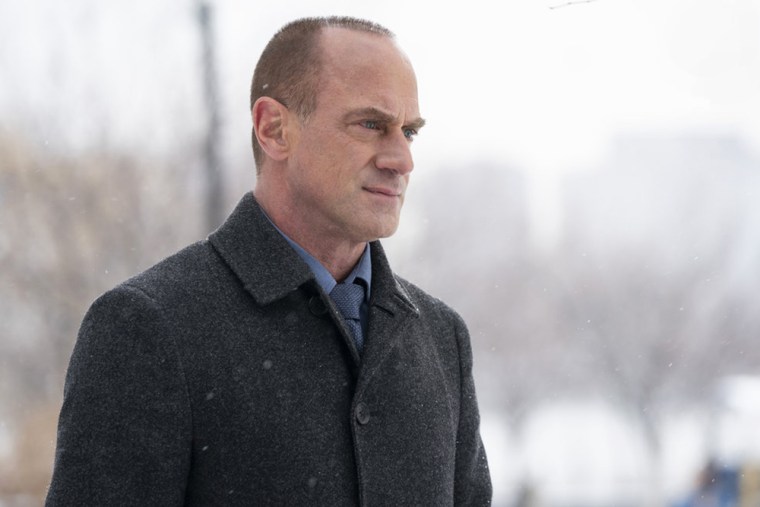This year marks 70 years since the debut of “Dragnet,” one of the first police procedurals to air on American television. Cop shows are undeniably one of the most enduring TV formats, from “The Untouchables” to “Miami Vice,” from “Hill Street Blues” to “Law & Order.” As broadcast now competes not just with cable but streaming, networks like CBS and NBC have come to rely more and more heavily on these workhorse shows, with multiple spinoffs and franchises. (NBC is owned by NBCUniversal, which also owns NBC News.)
On Thursday, the “Law & Order” franchise added a new jewel to its crown: “Organized Crime.” But while fans are buzzing about one of the most high-profile TV reunions in years, it’s unclear if we really need another cop show right now.
Hollywood has been quick to respond to the Black Lives Matter movement. Shows that glorify police violence, like “Cops” and “Live P.D.” found themselves canceled.
Hollywood has been quick to respond to the Black Lives Matter movement. Shows that glorify police violence, like “Cops” and “Live P.D.,” found themselves canceled. The writers behind police procedural formats said they’d reconsider how these series can function as unwitting propaganda, presenting cops as unquestionable heroes and relying heavily on racist stereotypes for villains. From comedies like “Brooklyn 99” to CBS dramas like “Blue Bloods,” everyone promised to rethink how they approached the genre. Even Dick Wolf, the man behind the incredibly popular “Law & Order” franchise, insisted he was retooling, especially after one of the writers from the then-recently greenlit “Law & Order: Organized Crime” threatened violence against the BLM movement. (He was fired.)
Wolf’s words carry weight. His initial 1990-era hit “Law & Order” kicked off the current model of prime-time police dramas that dominate the landscape. Its rerun marathons can literally span days of programming. But unlike some competitors, like “NCIS,” which has had multiple spinoffs, Wolf only had “Law & Order: Special Victims Unit” (known as “SVU”) still on the air when the protests happened last summer. The series stars Mariska Hargitay as Olivia Benson, still headlining the show after 22 seasons. (Spinoffs like “Law & Order: Criminal Intent,” “Trial by Jury,” “LA,” and the ultra-short lived “Law & Order True Crime” have all since been retired, with the original series sunsetting in 2010.)
“Law & Order” seems to be trying to position itself for a changing world. “Law & Order: Hate Crimes,” for example, has been in development in some form or another since 2018. And “SVU” is trying to follow through on its promises to shift perceptions. The fall premiere did a “ripped from the headlines” treatment of the Amy Cooper Central Park case, where Benson and partner Fin Tutuola (Ice-T) are accused of racial bias after wrongly arresting a Black man. Multiple episodes have discussed issues like accountability.
But “Law & Order: Organized Crime” is an altogether different matter, conceived as a way to reunite beloved “SVU” alumni Elliot Stabler (Christopher Meloni) with his old partner (now Captain) Benson. While Benson continued on the show, Stabler, a white cop prone to violent outbursts, had been retired after the show’s first 12 seasons, not long after a storyline where he shoots a suspect dead. (Though no one ever spoke publicly of his exit, it was assumed to be contractual issues that caused the actor’s exit.)
The new series does not shy away from this violent personal history. The two-hour premiere begins as a crossover with “SVU,” where Stabler and Benson team up again to find out who set off a bomb in Stablers’ car, killing his wife. Stabler’s anger still seems dangerously close to the surface, as he threatens a suspect who may or may not be a QAnon believer. Viewers are assured the old ways are gone, and Benson, as the woman in charge, spends quite a bit of the reunion pushing back on Stabler’s behavior, even as she continually sticks up for him. But as his new boss, Sgt. Ayanna Bell (Danielle Moné Truitt) observes, deep down its unclear if Stabler thinks he had a problem to begin with. (More important, it remains to be seen whether the show thinks he did.)
It’s a trope-y start for the new series, which leans heavily on the classic cop-out-for-revenge plotline. Moreover, despite the hyped reunion, Benson fans will be frustrated by Stabler's reticence. He keeps her out of the loop, refuses to clarify why he’s even in New York City, and offers lame excuses for his sudden departure. (Stabler’s abandonment of Benson has been a major part of her character growth, which makes the lack of a proper catharsis disappointing.) But the show does eventually give Stabler a reason for his reticence. He’s come back into town from Rome, and his cases are set up to be more dangerous than Benson’s usual beat.
It seems clear that the series plans to spend most of its time chasing henchmen who talk in heavy Italian and Russian accents and insist they don’t turn on “family.” Moreover, the show is also aiming for a more serialized story, rather than the more typical “criminal of the week” type pacing. This may be partly a way to try to avoid some of the uglier stereotypes of the procedural format. But it also makes for a “Law” and “Order” series lacking much of the “Order” side (with D.A.s, lawyers and judges). The show’s signature sound has also been edited out, which historically moved viewers from scene to scene and chapter to chapter.
Police procedurals are clearly here to stay. Just this week, CBS officially announced it would be reviving its massive hit “CSI.” “Law & Order: Organized Crime” may believe it’s improving the model, but, as the premiere ends, Stabler is already breaking the rules, and leaving Benson to stare after him in silent confusion and disappointment. Perhaps like Stabler, this series may not be willing to change where it counts.


